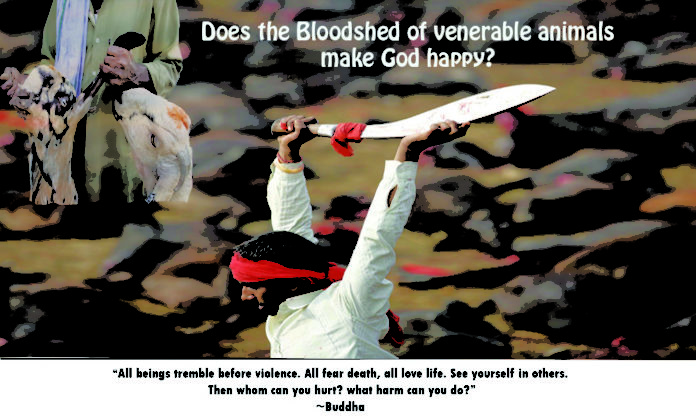Harmony And Peace Taken Over By Animal Slaughtering In The Name Of Religion!

Animal sacrifices, may it be in Hindu ‘Bali’ or Muslim ‘Qurbani’ has been evolved for centuries in the name of Region. ‘God’ symbolizes the divine power, the creation of lives on earth, a representative of purity, justice, equality, virtue, inspiration, Goodness, harmony and happiness. In another way, all creatures are his children and he would never yearn for his children's life to be sacrificed in his name. God has never asked for the bloodshed of his name to show love and devotion for him, then what is the origin of animal sacrifice and why? A Festival which is meant for cheerfulness, togetherness and joy is celebrated by taking a life in the name of religion, following all rituals.
History of Animal Slaughtering
Tracing back to the history of Animal Sacrifice, during the period of Yajurveda ‘Horse sacrifice’ known as Ashvamedha was very popular among the royal sacrifices mainly practised by the royal kings to show control over the region.
They customarily sacrificed the domestic animals and keep the wild animals free, and gradually this became a norm, tradition and a great religious belief in society. Also, it is believed that the ritual commenced at the beginning with a ceremony sacrifice of five animals “Pancha Bali”, which include a pig, a rat, a rooster, a goat, and a pigeon. During festivals, thousands and thousands of innocent animals are killed in the name of God. Late, Dr.B.R. Ambedkar tried to spread awareness and offence regarding this issue through a number of writings but norms and beliefs are difficult to change within a short span of time since it is deeply rooted in society.
In Countries like India, Bangladesh, Pakistan and Nepal where slaughtering of animals for different religious festivals is very commonly passed from century to century and from generation to generation. In such a situation, it’s a very difficult task to balance between Religions, morality, logic, laws, education, norms and beliefs. The first question in this regard that often pins me up ‘If killing a human is a crime then why slaughtering an animal with so much brutality is justified in the eye of the law?’
Basically, there is two classes of people in society and both a different perception, one arguing in favour of religion and the other in favour of morality. The persons sitting in favour of Region claim that animal sacrifice is their rich, ancient and ethnic ritual which is their fundamental right. And the other side of the people argues the fact that in the name of religion, it’s not ethical to kill innocent animals which is also prohibited in our Indian Constitution.
Animal Sacrifices in Hindu ‘Bali’
In Nepal, during the festival, tens of thousands of people gather in Gandhimai Temple and slaughter around 500,000 animals during the event, this brought forward seriousness to the debate on traditional beliefs vs cruel rituals. In India, in temples like Kamakhya in Guwahati, Kalibari temple in Silchar, Kalibari temple, Allahabad etc. animal sacrifices are prevalent. In Kamakhya, it is sacrificed for the Goddess Kamakhya and it is believed that when Lord Shiva carried the burning body of his wife Sati, her yoni fell in Guwahati which was later named Kamakhya Temple. Slaughtering Buffalo is the most prevalent ritual in the society mainly performed for the Goddess. When killing occurs in the name of religious practice the entire problem becomes crueller and the mass slaughter gets severe. Many consider that by sacrificing animals, they bring luck, prosperity, power and happiness to the family.
Animal Sacrifices in Muslim Bakr-Eid/ Qurbani
Bakr-Eid in India is mainly popular for Goat sacrifices which are celebrated by Muslim communities across India. They believe that it symbolizes the willingness of Ibrahim who sacrificed his son at the command of Allah. Henceforth the festival is notable for killing the goats in the name of Allah followed by some rituals like being well-fed before the Qurbani and several other customs. In Uttar Pradesh last year, ahead of the Bakr-Eid, a number of prominent Muslim groups and leaders insisted the followers of Islam circumvent offering animals on roads and uphold hygiene, implement limitations and not give cause people of other societies to grumble. The matter to concern is that in the name of God, Allah or Bhagwan a feeling of love, togetherness and happiness should be spread rather than slaughtering the venerable animals.
Animal slaughtering may it be ‘Bali’ or ‘Qurbani’ can’t really put the cover on the severe truth that animals are being killed. People actually don’t need to be vegetarian or vegan to understand the pain of the animals. Being a non-vegetarian is completely a different issue altogether and there is a huge difference between consuming meat and performing sacrifices in the name of religion. But the truth is they sacrifice the animals for God and later they have themselves as their delicious meat. They use to cook the flash of the sacrificed meat and sell the skin to the traders who they have contracted with.
Indian law on Animal Sacrifices
“Article 25 of the Indian Constitution enforces, that every individual has a Fundamental Right under the Constitution not just to divert a Religious Belief as may be permitted by his Judgement but to demonstrate notions in an unconcealed act as are authorized by their Religion and also to liberally promulgate its views. “Prevention of Cruelty towards animals”. Section 268 of the Indian Penal Code, 1860 also prevents the sale of animal sacrificial. But, all laws don’t prevent them from killing animals and still in many festivals they sacrifice the bloodshed in God’s name.
Thus, the Court put forward that sacrifice on Bakrid is not a mandatory act which would form an indispensable part of the Religion and thus the ban on sacrifices would not violate. India’s Supreme Court recently asked the government to discontinue the illegal act of animals into Nepal for the ceremony. Also, the 2001 rules of the Indian constitution prevent cruelty towards an animal.
Conclusion:
This article throws light on the crime that is prevailing in the name of Religion which has no relation to well-being and command of God. In this regard, many argue that religion, tradition and culture are our heritage and are of foremost importance but is it ethical of killing an animal in the name of protecting religion? The demand of today’s century is ‘change’, change in a good way, and practice life-saving tasks instead of life-taking tasks. And it should be from within, from each and every individual. The responsibility of educated youngsters is to spread awareness among the people on this serious issue and convince the people to worship with peace because God represents ‘Good’ ‘Love’ and ‘Harmony, not hatred.


 By
By
leave a comment